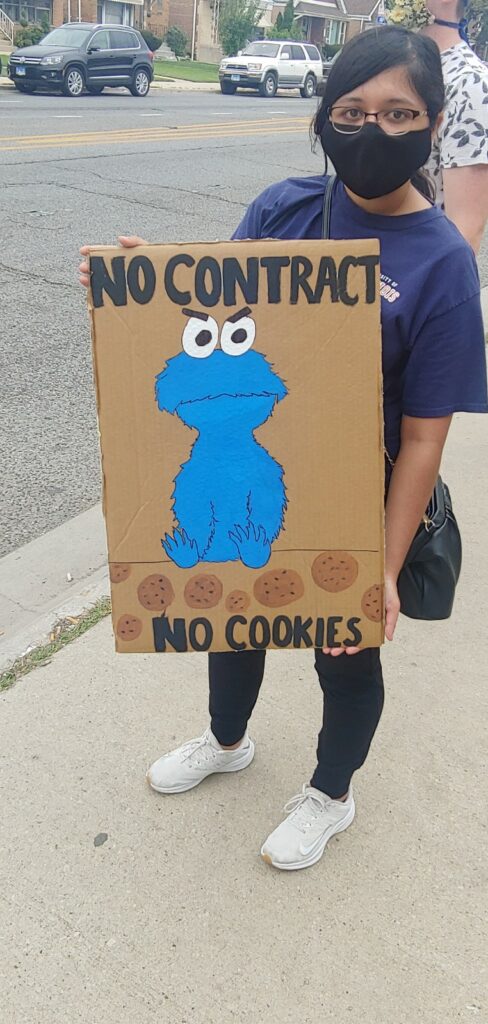Labor Day on the picket line
Solidarity with striking St. Vincent nurses and Nabisco workers

It’s hard not to notice that there’s been an uptick in strikes across the country. Lauded as “essential workers “ in the early days of the pandemic, many of these same workers have found themselves on the picket line this year. Instead of granting reasonable pay increases and safe working conditions, ungrateful bosses are demanding major concessions despite huge profits.
Real heroes, like the nurses at St. Vincent Hospital in Worcester, Massachusetts, have been on strike since March 8, making it the longest strike in that state’s history. The nurses, represented by the Massachusetts Nurses Association, are resisting management’s effort to implement unsafe nurse to patient ratios.
At the same time, one thousand food processing workers represented by the Bakery, Confectionery, Tobacco Workers and Grain Millers’ International Union (BCTGM) are striking across five states against the international snack food behemoth Mondelez, best known to U.S. consumers by the brand name Nabisco. The last time there was a national strike at Nabisco was in 1969.

Workers at Nabisco are striking against working conditions that are more reminiscent of the early days of the industrial revolution than anything experienced by unionized workers in the late twentieth century. One striker told Jacobin:
If you call somebody in, you might get lucky enough to go home in twelve hours, but often you aren’t lucky. On Saturdays, they force us to come in, and then they force us into another shift right after that because people don’t come to work. We’re scared to come to work on Saturdays because we’re going to be forced into another shift.
The issues that drive the on-going Nabisco strike are identical to the ones behind the Frito-Lay strike in Topeka, Kansas earlier this summer. The Frito-Lay strikers, also represented by the BCTGU, settled the strike on terms that disappointed many rank and file members. A sizable number of strikers on Facebook had announced that they were going to vote no.
Given the labor shortage across the economy, where unionized employers like United Parcel Service (UPS), and non-union employers like Amazon, are raising wages and offering bonuses to attract workers that they desperately need, unions should be pressing hard to make significant gains on all fronts in contract negotiations. We should not be accepting of mediocre contract settlements when economic conditions are so favorable to our side. Yet, we’ve seen this far too often. The United Auto Workers (UAW) leadership employed an old bureaucratic tactic of having their members at Volvo vote three times, until they voted yes on a contract proposal that nearly half still rejected.
Earlier this year, veteran trade union leaders Peter Olney and Rand Wilson put forward a perspective for upcoming contract negotiations and the political opportunities it represent for the left. They wrote,
This year, 450 collective bargaining agreements covering more than 200 union members apiece will expire, according to Bloomberg, which maintains the most comprehensive database of expiring agreements outside of the AFL-CIO. Of these, 160 agreements cover more than 1,000 workers. These 450 contracts, involving more than a million and a half workers, are an ideal opportunity for the labor movement to showcase our power and the advantages of collective bargaining.
“In our experience,” Olney and Wilson further wrote, “unorganized workers are generally attracted to unions that engage in contract campaigns and strikes. For example, after the 1997 Teamsters’ UPS strike, workers at FedEx, Overnite, and many other freight and delivery companies were inspired to try to form unions with the Teamsters.”
Much of what Olney and Wilson put forward was undoubtedly true. However, the major difference between 1997 and 2021 is that there is no national union comparable to the Teamsters at a major national employer like UPS with a militant reform leader like Ron Carey willing to strike on a national scale. The Nabisco strike, however, has drawn support in the locales where plants are on strike. Democratic Socialists of America (DSA) members in Portland and Chicago have organized rallies and financial support for the strikers. DSA has also organized national calls to support both the St. Vincent and Nabisco strikers.
The more popular support that can be mobilized to support those walking the picket line this Labor Day, the more likely we can win the contract demands that workers deserve after a year that many people consider the worst in their lives. Let’s build international solidarity!
Image Credit: BCTGM. Modified by Tempest.
Categories
We want to hear what you think. Contact us at editors@tempestmag.org. And if you've enjoyed what you've read, please consider donating to support our work:
Donate